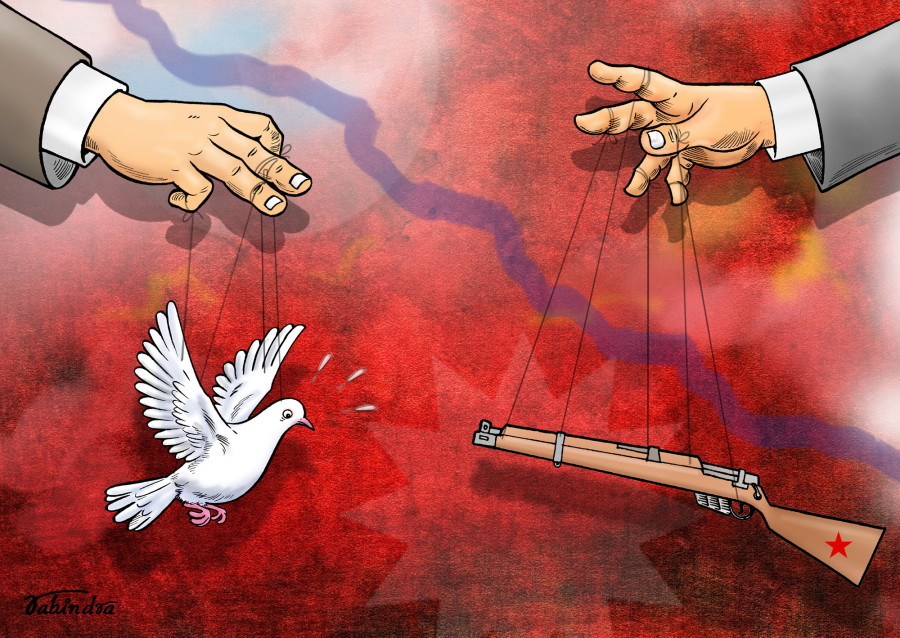National
Transitional justice bodies still without leadership as political parties disagree on candidates
While the Nepali Congress recommends Surya Dhungel, the ruling communist party wants Govinda Sharma ‘Bandi’ to lead the truth commission
Binod Ghimire
Four months into its term, the committee formed to recommend the leadership of the two transitional justice commissions has made no headway, seemingly awaiting consensus among the political parties on the candidates.
A Friday meeting of the recommendation committee concluded without a decision after holding minor discussions on the selection criteria. Even though a number of individuals have applied for the positions, including the chief commissioners at the two commissions, the recommendation committee is waiting for a common name from the political parties, said officials at the Ministry of Law and Justice, which hosts the secretariat of the recommendation committee.
“The committee might be willing to name the candidates but it hasn’t dared do so without a green signal from the parties,” a senior official at the ministry told the Post on condition of anonymity as he was not allowed to speak to the media. The committee has instead been asking the parties to finalise the names as soon as possible, as the delay in recommendations is raising questions over its competency and motive, according to the official.
Each major party wants its own candidate in the Truth and Reconciliation Commission. The two factions within the ruling Nepal Communist Party (NCP), split along their former party line, have forwarded two names to the recommendation committee while the Nepali Congress has named its own candidate. Negotiations have begun but no conclusion has been reached yet.
The opposition Congress is pushing for Surya Dhungel, former advisor to former president Ram Baran Yadav, while the UML faction in the Communist Party wants Govinda Sharma ‘Bandi’, an advocate who has fought several cases on behalf of victims. Former attorney general Raman Shrestha is the pick of the Maoist faction.
Multiple sources say that the choice is between Dhungel and Bandi. Dhungel, a retired professor from the Nepal Law Campus, has worked with the Office of the United Nations High Commissioner for Human Rights in Cambodia and Thailand, and the UN special mission in Liberia. Bandi, meanwhile, is an advocate who has led the International Commission of Jurists’ Nepal programme on human rights and transitional justice.
Dhungel is more experienced than Bandi but he lacks Bandi’s experience and understanding of Nepal’s conflict, say lawyers who’ve worked with both individuals.
The Communist party has argued that as the Congress chose leadership of the truth commission last time around, it is now the ruling party’s turn. In return for leadership of the Truth and Reconciliation Commission, the ruling party is offering the Congress the commission on disappearances, say a senior leader from the Nepali Congress.
The Nepali Congress, however, has argued that as a major stakeholder of the peace process, it must get leadership of the Truth and Reconciliation Commission. Surya Kiran Gurung, former chair of the truth commission, was nominated under the Congress quota in 2015.
Records at the recommendation committee show that Kamal Narayan Das, a former Supreme Court justice, and Ali Akbar Mikrani and Kalauddhin Akhtar Ansari, former chief judges of Appellate Court, are among applicants for chairmanship of the truth commission. Former government secretary Madhu Regmi has also applied for the same post while Tara Bahadur Neupane, a lecturer at Nepal Law Campus, and advocate Durga Bahadur Ghale have applied for the leadership of either commission.
“We will first finalise the criteria and then list the names of the candidates from among the applicants and other qualified personalities,” Sharmila Karki, a member of the recommendation committee, told the Post.
The committee has legal leeway to recommend the names other than those who’ve applied, and political parties are using these grounds to appoint individuals of their choice, even though conflict victims have demanded that the selection process be fair and impartial. They’ve said that they will not accept nominations if party affiliation trumps qualification.
The Conflict Victims Common Platform, an umbrella body of victims’ organisations, presented a memorandum on Thursday to the minister for law and justice, the recommendation committee and representatives of the major parties, saying that the transitional justice process cannot be credible if the leadership of the two commissions is not competent. It has also asked the government to amend the existing transitional justice Act before the new leadership takes office.
Leaders of the Platform have been meeting with party leaders and government officials to expedite the amendment and appointment process by ensuring full transparency. Attorney General Agni Kharel, in a meeting on Friday, said that the government and the parties were serious about concluding the transitional process with full credibility.
The government in March formed the recommendation committee, led by Chief Justice Om Prakash Mishra, to recommend names for chairpersons and members to the Truth and Reconciliation Commission and the Commission of Investigation on Enforced Disappeared Persons, after all positions became vacant on April 14. Initially, members of the selection panel had said that they would select the names within a month but four months later, they remain undecided.
What do you think?
Dear reader, we’d like to hear from you. We regularly publish letters to the editor on contemporary issues or direct responses to something the Post has recently published. Please send your letters to [email protected] with "Letter to the Editor" in the subject line. Please include your name, location, and a contact address so one of our editors can reach out to you.




 11.12°C Kathmandu
11.12°C Kathmandu














